Reviews
Douglas Hickox
UK, 1973
Credits
Review by David Carter
Posted on 14 July 2011
Source MGM DVD
Categories Vincent Price
What do you know of the blood, sweat and toil of a theatrical production? Of the dedication of the men and the women in the noblest profession of them all? How could you know you talentless fools who spew vitriol on the creative efforts of others because you lack the ability to create yourselves!
—Edward Lionheart, Theatre of Blood
Vincent Price reportedly called Theatre of Blood his favorite film from his own oeuvre. It wasn’t his most commercially successful or his best known. Price preferred Theatre of Blood because it allowed him to indulge in a pleasure he’d been denied by virtue of his typecasting as a horror film star: the works of Shakespeare. The fact that Price had yet to tackle the Bard on screen directly (both versions of Tower of London were horror films loosely based on Richard III) says a great deal about his character. Price had the name recognition and financial security to star in any picture of his choosing, and far lesser stars’ careers are littered with vanity projects. He knew what types of roles and films audiences wanted to see him in, however, and by all accounts Price was humble about his success and content with being a horror icon—a sharp contrast to Theatre of Blood’s homicidally vain Lionheart.
Shakespearean actor Edward Lionheart commits suicide in a very public manner after being shunned for the Critics’ Circle’s award for Best Actor. He survives, living in secret until the ides of March when he disposes of his first tormentor, critic George Maxwell, via group stabbing, a la Julius Caesar. Murders in the style of Troilus and Cressida, Richard III, and Titus Andronicus follow, along with a particularly gruesome interpretation of the climax of Merchant of Venice. The police refuse to believe the remaining critics’ insistence that the deceased Lionheart is to blame, so his daughter, Edwina, becomes prime suspect. Edwina has secretly been aiding her father, so he reveals himself to the head of the Critics’ Circle Peregrine Devlin in order to clear her and taunt the man he holds most responsible. Knowing that Lionheart is alive does little to aid the police in stopping his rampage, and soon he and Edwina begin the climax of their revenge plot by ensnaring Devlin in a King Lear inspired trap.
To adopt the attitude of one of Theatre of Blood’s ill-fated critics: this film is largely unoriginal and little more than a gorier rehash of The Abominable Dr. Phibes. The similarities are so unmistakable and the fact that it came immediately after Dr. Phibes Rises Again! makes it doubtful this connection will be lost on any viewer. The changes made are minimal: the setting has been moved to the present day and rather than Biblical or Egyptian themes, the murders are patterned after the works of Shakespeare. The formula from Abominable is copied whole-cloth—Phibes/Lionheart and his assistant Vulnavia/Edwina face off against the bumbling inspector Trout/Boot and a potential victim, Vesalius/Devlin.
It is unfair to dismiss it as merely a clone, however, and to do so would discount the fact that Theatre of Blood is more enjoyable than its predecessors. The similarities between the films are numerous, yet the differences are far more substantial, particularly with regard to Price. The gulf between our perceived image of Price, the man, and his Theatre of Blood character are jarring. Those of us with an affinity for his work tend to view him with some reverence, which colors our perception of his films. Reverence isn’t fear, which was his goal in those legendary roles and there is a degree to which a horror film becomes unsuccessful if it cannot generate fear, revulsion, or some form of unease. Theatre of Blood manages all three, giving us a Vincent Price that is sadistic, cruel, and downright chilling. He achieves a level of menace not dulled by his familiarity and I’m thus inclined to agree with the assessment of it as his finest performance.
I identified The Abominable Dr. Phibes as a proto-slasher and Theatre of Blood expands upon those ideas. This film is, to my knowledge, one of the first to utilize the post-mortem bon mot extensively, which would later become de rigueur in both slasher and eighties action cinema. Price delivers these lines with a visible glee, savoring every word as if it, too, was Shakespearean. Theatre is considerably more violent than Phibes and more so even than any other film in Price’s oeuvre. The production quality is lower, giving Theatre a gritty, pseudo-grindhouse appearance, filled with muted and washed-out colors and a perpetually gray sky—the only vibrant color in the film is blood. Theatre of Blood more closely resembles the dour seventies American and British detective dramas and the Italian gialli (both large influences on what would become the slasher) than the Technicolor oneirism of his previous films.
The one element that contributes the most to Theatre’s place as a proto-slasher and its reconstruction of Price’s image is the verve with which it vilifies its victims. The Critic’s Circle is one of the most loathsome groups of victims to appear in a horror film. They are impossible to sympathize with in any way even if, like I, you’re in the same profession. They are arrogant, unintelligent, and unsympathetic to one another, reacting with complete indifference as their ranks dwindle to nothing. Devlin is by far the most insufferable and, despite being the film’s de facto hero, most viewers will be disheartened to see him survive. Utterly unrepentant for being responsible for Lionheart’s killing spree, Devlin opts to have his eyes gouged out than recant his bad reviews of him. In a precursor to the style of horror filmmaking that would become prevalent from the late seventies to the present day, you’ll cheer as Lionheart achieves catharsis both for himself and we, the audience; vicariously enjoying bullies and dullards getting their comeuppance.
Theatre of Blood is my favorite Vincent Price film as well. This is primarily due to it being so far removed from the rest of his work. Price sneered and snarled on screen for over fifty years but, if I’m being honest, these performances made me respect his acting abilities more than his ability to inspire fear. Theatre of Blood is the first and only role of his where I was actually terrified by him, as he radiates enough evil to make one forget that he was a gourmet, a lover of fine art, and an incredibly witty and charming man. On another level, it also my reverence for Price that draws me to the film. His enjoyment of the role is both palpable and infectious, and it is a rare treat to be able to watch the master of horror cinema having the time of his life.
More Vincent Price
-
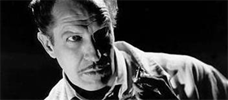
The Tingler
1959 -
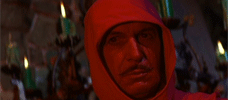
The Masque of the Red Death
1964 -

The Last Man on Earth
1964 -
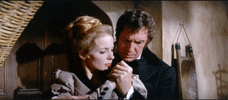
The Tomb of Ligeia
1964 -

War-Gods of the Deep
1965 -
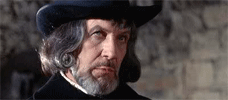
Witchfinder General
1968 -

More Dead Than Alive
1969 -

The Abominable Dr. Phibes
1971 -
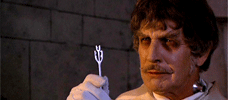
Dr. Phibes Rises Again!
1972 -
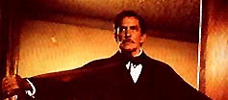
Theatre of Blood
1973
We don’t do comments anymore, but you may contact us here or find us on Twitter or Facebook.



